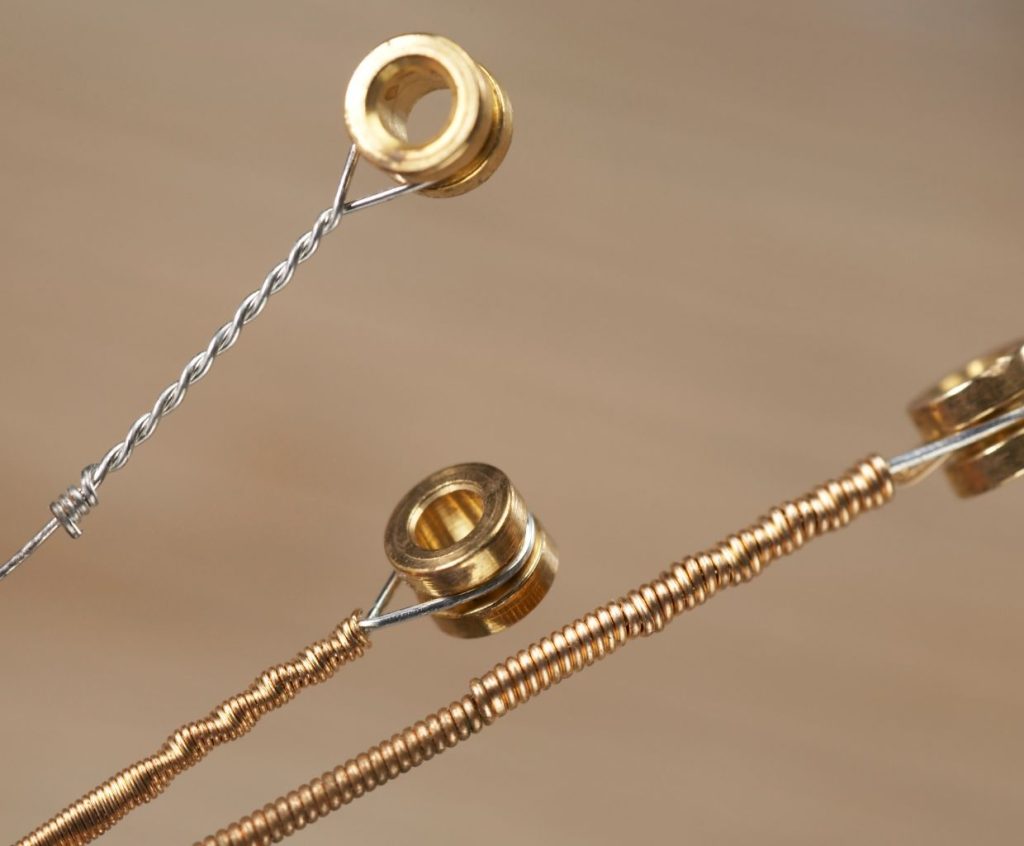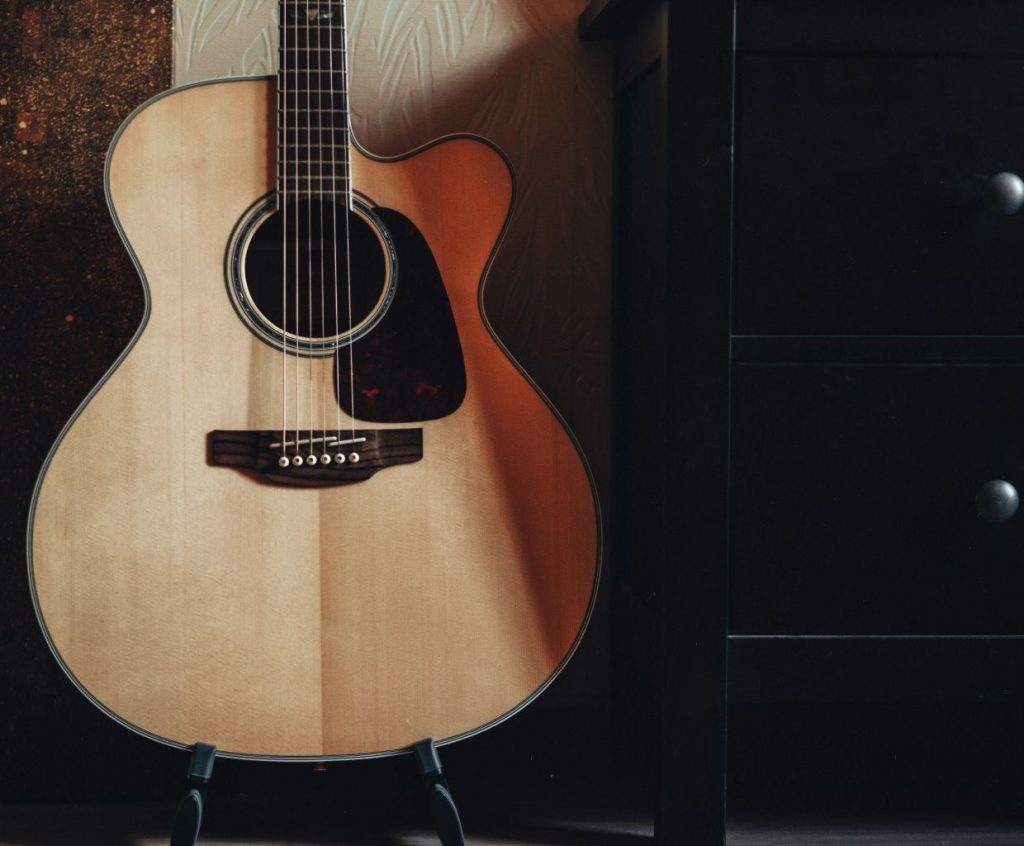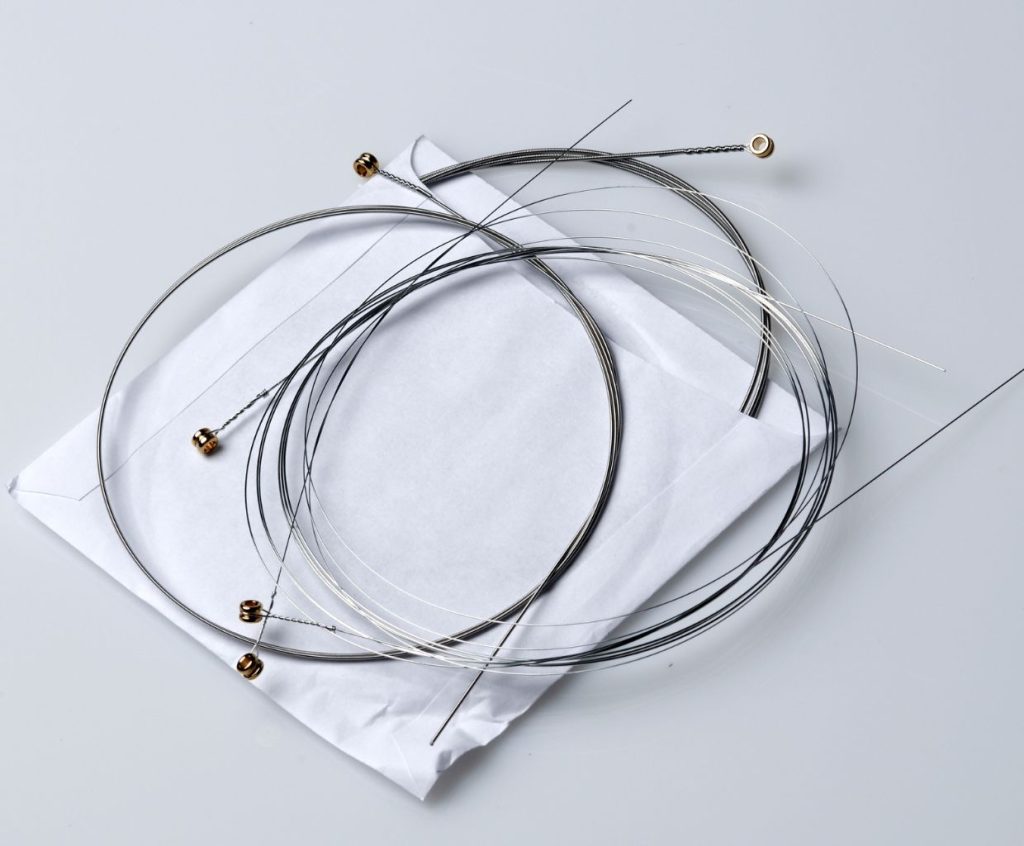Best Acoustic Guitar Strings – The Complete Guide And Ultimate Reviews
What are the best acoustic guitar strings? To help you find it out, we tested 20 guitar strings from 4 top brands and finally came up with the top 5 best acoustic guitar strings reviews! Please keep reading to see the secrets about guitar strings that nobody tells you except me. Then, check this out!
Now that you have an excellent acoustic guitar to start your musical journey with, the next step is to tie it up with excellent-quality strings which are perfect for your style of music.
Strings are significant for acoustic guitars because the strings’ vibration gives the sound. No pickups and no amplifier. Strings are the medium you will play, making choosing the best acoustic guitar string important.
This guide on buying the best strings has the top 5 acoustic strings you can have. I hope you can get a good idea of choosing the perfect set of strings using this guide.
Table of Contents
Things To Consider When Buying The Best Acoustic Guitar Strings
Your Guitar’s Type, Size, Shape, And Build
Different guitars use various types of strings. Acoustic guitars use steel strings with higher tension, while Classical guitars use nylon strings. Using the wrong string type for your guitar can damage it, as it was never built to handle the wrong strings. Also, you have to keep in mind that strings vary not only in materials but also in thickness. Thicker strings are more suitable for more prominent guitars with longer scale lengths. Make sure you know your guitar’s size and build, determining which type of string will fit.
Choose The Right String Gauge
Gauge refers to the thickness of the strings. Different gauges mean different tones and different difficulty levels of play. I will discuss this factor in more detail later in this guide. But the critical thing to know is that lighter gauges are for smaller bodies and unsuitable for heavy strumming. Also, higher gauges are harder to play with and suitable for bigger bodies like a Dreadnought. They emphasize the bass and need more force to play. What string gauge fits you the best will be decided by your guitar size and playing style.
Choose The Right String Material
I’ll talk about this later in this guide since it’s essential and needs more explanation. But in short, different string materials feel sound and age differently. The two most popular string materials are Phosphor Bronze and Bronze only. Bronze strings are brilliant and sharp, but they also age quickly.
Phosphor Bronze doesn’t age quickly and offers a good balance between warm tones and bright sounds. There are also steel and silk strings, which can break easily but are not harsh on your fingers and low on tension. This makes them suitable for vintage guitars, which won’t be played much anyway. There are also nylon strings for classical guitars, which are thicker than steel strings but easier to play. Choose the string material based on your guitar body and music preference.
Your Budget And How Often You Change The Strings
Price, like any other product, is a factor that will decide which string set is the best for you. Spending a lot to get good sound is unnecessary, but it also does not mean you should not spend a little on something vital for your guitar.
Also, if you keep changing strings every few weeks, you should save some money and buy strings that do the job well instead of getting a top-of-the-line set. But if you change your strings only when necessary and don’t need to brand new strings for your practice, buy one good set that may be expensive but give a lot more value.
Brands And Best Acoustic Guitar Strings Reviews
There are hundreds of brands that offer acoustic guitar strings. But I recommend you go for a reputed brand specializing in acoustic guitars and strings. It will guarantee good sounds and durability. D’addario, Elixir, and Martin are a few brands that give some of the best quality strings you can buy.
Another thing you’ll need to do is look up the strings you are planning to buy online if you don’t mind.
You can review reviews and opinions of people who have used the strings. Also, the best thing would be to go to a music store and play the strings. You can get a first-hand experience of how the strings feel and sound. If you are satisfied, buy them then and there!
Best Acoustic Guitar Strings Reviews – Type Of Guitar Strings
1. Based On Materials – The Key To Finding The Best Acoustic Guitar Strings
Different string materials are suitable for various types of guitars. Also, there are variations within one material, which have different sounds because of different outer wraps or wounds. String materials, as well as their outer layers, can be constructed of nickel or bronze, as well as many other combinations of materials, like silk and steel, phosphor and bronze, and copper bronze.
Steel = Popular with folk musicians and players whose fingerpick is pure steel strings or silk steel. These strings have a steel core, are soft to play, and sound brighter.
They are also used on vintage guitars with low-tension light strings. Steel may be coated with bronze, copper, polymers, nylon, or brass. Polymer-coated strings last very long but are less bright.
Phosphor bronze strings are the most common for acoustic guitars, as they have a balanced sound and last long. Aluminum bronze has an even more precise and pronounced sound but is expensive.
Nylon = Nylon strings are made for classical guitars. They may be coated with copper or metal to add weight to the lower three strings, but the core will still be nylon. These strings are soft to play and should not be put on acoustics, which needs steel strings.
Nickel = Nickel strings are an industry standard for electric guitars. Pure nickel strings are used because of their mild output and warm sounds with precise bass. But they are also heavy and stiff to play with. Electric guitars also use nickel-plated steel strings, which are easier to play with a little more output.
2. Based On Guitar Type
Because each string material has its tension, sound, and feel, different guitar types use different strings. It is not at all good to put strings on your guitar which don’t match its type.
Acoustic guitar = Strings for an acoustic guitar are often neither stiff nor that soft. Because acoustic guitars are made to handle more string tension, they use steel strings, not nylon ones. Also, you should note that the lower strings are different from, the higher bass strings, as they have to produce different sounds.
Lower strings can be pure steel, while the upper strings may be coated to give them more durability and warm tones. The steel strings can be bronze, phosphor bronze, silk-steel string, or polymer coated, as I told you before.
Classical guitar = Classical guitars use nylon strings, which may or may not be coated. It can also be that a classical guitar uses non-nylon strings that sound and behave like nylon. But what indeed won’t work is steel or nickel strings. The most popular type of classical guitar string is Clear Nylon, which is very clear and loud.
Other types are Rectified Nylon and Black Nylon, which are broader in their tones. Titanium strings are also used sometimes, which are brighter than usual Nylon strings and give a dark sound and feel smooth.
If you are a folk guitarist looking for Nylon strings, I recommend you go for the ball-end nylons, as they are a little heavier than regular nylons and can handle more powerful strums.
Electric and Bass guitar = Electric guitars depend on pickups and amps for their sound. This is why they need strings that respond well to electricity and the magnetic field generated by the pickups. Steel wound strings and nickel strings are the most common for electric guitars.
Bass guitars need to sound heavy and loud. Thus, they use the thickest and most stiff strings of all guitar types. The two main categories of electric bass strings have windings made from nickel/steel alloy or pure stainless steel. Steel strings are bright and resistant to corrosion, while Nickel strings are warm and mellow.
Country players favor the pure Nickel strings. The Nickel-Steel string is somewhere in between and the most common. It combines the brightness of Steel and the warmth of Nickel.
3. Based On String Gauge
String gauge refers to the thickness or diameter of the strings. It is expressed in decimals, in thousandths of an inch. Different gauges mean different playability, tension, and volume. Gauges are divided into heavy, medium, light, and extra light.
Heavy Gauge = .014, .018, .027, .039, .049, .059
Heavy Guage strings are the thickest and thus exert more tension on the guitar body. Heavy gauge is harder to play, and I would never recommend a beginner to start with these strings. These may be harder to play, but they have more sustain and volume. Because of their heavy bass sounds, they are used on big-bodied guitars like the Dreadnoughts or by players for rough strumming and acoustic bass.
Medium Gauge = .013, .017, .026, .035, .045, .056
Medium gauge strings are the most used because they are easier to play than heavy ones and sound warm and loud. Generally, guitars use a combination of medium and light strings for versatility. Medium strings are used by a little more experienced players who strum a lot and need something that can handle attack and power on their strums.
Light Gauge = .012, .016, .025, .032, .042, .054
Light gauge strings are the ones used by beginners. They don’t last as long as heavy strings, but they are easier to play and practice on. They exert less tension and are easier to fret, so they are used on smaller bodies. If your play both strumming and fingerpicking, a light-medium set will be a good choice.
These strings have heavier gauges on the bottom three strings and lighter gauges on the top three. More miniature and vintage guitars will sound better and be safer with lighter gauges.
While choosing the correct string gauge, remember how much your fingers and guitar can handle. Starting with a light-medium set is good. Later, you can move on to an all-medium string set which will last longer and give you more volume.
Top 5 Best Acoustic Guitar Strings
#1: D’Addario EJ16-3D
At a price of little more than $10, these strings are one of the selling strings in the world. Light gauge and Phosphor Bronze are ideal for any player, especially an acoustic beginner.
The light gauge ensures comfortable playing, and the phosphor bronze coating makes the string last long and sustain nicely. D’addario is the world’s largest manufacturer of musical strings, and they have maintained the trend of delivering good quality strings.
The set comes with the lowest two strings of gauges, 0.12 and 0.16, and the remaining four strings of medium gauges of 0.24, 0.32, 0.42, and 0.53. This combination of light gauges is ideal for a standard acoustic guitar and delivers good tonal range while not damaging your guitar’s neck.
#2: Elixir Strings 80/20 Bronze NANOWEB
Another bestseller among acoustic strings, the Elixir Bronze Nanoweb strings come with an ultra-thin coating that prevents rust, dirt, and dust from accumulating on the windings.
The gauges on this set of strings are the same as the D’addario set – 0.12 to 0.53. There are variations of this 80/20 Bronze string set. Polyweb strings are warmer in sound and have anti-rust plating. There is a Phosphor Bronze version, which gives a balanced tone with even more durability.
This particular Bronze 80/20 set is a little more on the bright side. But overall, the tones are balanced, and the string feels smooth. I have used these strings and liked the Nanoweb coating because the strings feel uncoated, which I prefer. The coating also makes the strings more consistent as there is not much chance of humidity, sweat, and dirt damaging the strings.
#3: Ernie Ball Earthwood Phosphor Bronze Strings
Ernie Ball is a company that has long specialized in acoustic strings. Artists like Billie Joe and Paul McCartney use their Phosphor Bronze Medium strings. Their Phosphor bronze strings come in various gauges – medium, medium-light, and extra light. So, you can choose whichever gauge suits you. I once used their medium-light string set and was very satisfied with its feel and sound. You could go for their light version if you like.
Their medium-light set has gauges 12, 16, 24, 32, 44, and 54. The top two strings are much more gauge than the D’addario and Elixir and hence will last a little longer and give more volume.
Made from 92% copper and 0.3% Phosphor wire (not the usual 80/20), the strings have a good clear sound, and playing with some medium strings at the top makes your fingers stronger. The sound is very well balanced, too, with equally good treble and bass.
Their light string set is ideal for a beginner and ranges from 11 to 52 gauge—a good starter string set. The strings are great value for money at less than $10.
#4: Martin M150 80/20 Acoustic Guitar Strings
Martin is a name familiar to any musician. Martin makes not only excellent guitars but also excellent strings. The M150 80/20 Bronze strings are exceptionally cheap yet great medium gauge strings.
Because they are bronze strings, they are very loud and bright. The gauge ranges from 13 to 56, perfect for a beginner looking to upgrade his strings and go for something more heavy and loud. The M150 comes with a set of 3 6-strings at only around $10. It’s a fantastic deal. And given that bronze ages more quickly than Phosphor bronze-like Elixir’s strings, getting 18 at that price is excellent.
If you are looking for medium gauge strings which will give bright sounds at low prices, you won’t find anything better. Another great thing is if you cannot handle medium gauge, you could go for the M140 light version, which comes at the same price.
#5: Vibe Phosphor Bronze Medium Gauge Acoustic Strings
The Vibe is an exclusively online brand. But no need to worry. Vibe strings have been received very well by many players. Vibe’s Phosphor Bronze strings come in all gauge ranges – heavy, medium, light, and extra light. All of them are at the same price and packaged with a vacuum so that there is no damage from the outside environment before you open the package.
Perfect for beginners are Vibe’s Phosphor bronze light strings. The Phosphor adds to the durability; the bronze gives it a bright sound, and the medium gauge of .011 to .050 adds to the playability. I recommend starting with Vibe’s Light string set and moving on to the medium strings once you find your music style and personal preferences.
Acoustic Guitar Strings – My Final Thoughts
Strings are something you cannot play your guitar without. Choosing the right strings is essential because it will determine how your guitar will sound for the next few weeks and how your playing style will grow.
Consider many factors when choosing the best acoustic guitar strings, some important ones being your guitar body, the string gauge, and music taste. But you don’t need to worry. The start will be light; later, you can upgrade when your fingers become solid and rigid. A small acoustic guitar should never be fitted with a heavy gauge, but a standard-sized guitar or more extensive body can be fitted in any gauge according to what you want to play.
For fingerpicking, the light gauge would be better. For strumming and fingerpicking, a medium-light set would be the best. Heavy gauge is used when you strum with mighty and rough strokes and need a lot of basses.
Whatever your choice, you can always upgrade quickly. It is easy to find a good set of strings for cheap. Just keep playing and experimenting a little. Please tell us about your experience with new strings and how you chose them. Leave your ideas and suggestions in the comments below and share the article about our best acoustic guitar strings reviews if you like them.
Read more:
- What Are The Best Ukulele Strings? – Ultimate Buying Guide And Reviews
- How To String A Guitar
- Ultimate Acoustic Guitar Buyer’s Guide: Best Acoustic Guitar For Beginners
- Ultimate Buying Guide and Best Acoustic Guitar Reviews









